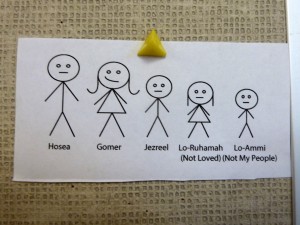(Here’s the 18th post in my continuing series on the Psalms for All Seasons Sunday school class I co-teach with Andrew Friend. Each week we sing psalm settings from Psalms for All Seasons, Lift Up Your Hearts, and other CRC hymnals. Previous posts is the series focused on Psalm 121, Psalm 122, Psalms 2/99, Psalm 72, Psalm 95, Psalm 147, Psalm 112, Psalm 29, Psalm 40, Psalm 23, Psalm 27, Psalm 130, Psalm 15, Psalm 51, Psalm 6, Psalm 32, and Psalm 143.)
Our class looked at Psalms 38 & 102 (along with Psalm 143) during our fourth and final Sunday (Feb. 16) on the seven penitential psalms. Neither Psalm is included in the Revised Common Lectionary.
Psalm 38 is a lament about the psalmist’s horrible afflictions brought about by his sins and a cry for help from the Lord. The opening prayer is almost identical with the opening of Psalm 6, but the author of Psalm 38 goes into much greater detail about his physical suffering.
The Word Biblical Commentary (Craigie & Tate 2004), which labels it “A Sick Person’s Prayer,” notes the great number of symptoms: “At first sight, it appears that the patient as almost every disease in the book: the opening description of unhealthy ‘flesh’ and ‘bones’ is a blanket description, the ‘flesh’ signifying dermatological or surface complaints, the ‘bones’ covering all internal complaints. The specific complaints are staggering in their proportions: open wounds, burning loins (ulcers?), numbness, congestion, a “growling heart,” palpitations, and trouble with the eyes” (p. 303-304)
My wounds fester and are loathsome
because of my sinful folly.
I am bowed down and brought very low;
all day long I go about mourning.
My back is filled with searing pain;
there is no health in my body.
I am feeble and utterly crushed;
I groan in anguish of heart.
The psalmist also feels abandoned by other people (“My friends and companions stand aloof from my affliction, and my neighbors stand far off.”) and God. Unlike Psalm 6, Psalm 38 gives no hint that the prayer of psalmist has been heard. It ends with a final plea to God.
Lord, do not forsake me;
do not be far from me, my God.
Come quickly to help me,
my Lord and my Savior.
The only Psalm 38 setting in Psalms for All Seasons and Lift Up Your Hearts is “Rebuke Me Not in Anger, Lord” (PFAS #38A/LUYH #150/PH87 #38). It is another setting with an original versification for the gray Psalter Hymnal (by Helen Otte) but it is set not to a tune from the Genevan Psalter but BOURBON. However, the turn was changed to CHICKAHOMINY for LUYH and PFAS. I associate CHICKAHOMINY with “Ride On, Ride On in Majesty” (LUYH #149/PH87 #382), which is its tune in the gray Psalter Hymnal. However, it is changed to DEO GRACIAS in Lift Up Your Hearts. (The two hymns are listed side-by-side in LUYH since their tunes are interchangeable. Psalms for All Seasons’ performance notes for “Rebuke Me Not in Anger, Lord” suggests that “Stanzas 3, 4 and/or 6 of this setting may be interlaced with readings of the gospel passion narratives or with the singing of Henry H. Milman’s hymn “Ride On, Ride On in Majesty.”)
Rebuke me not in anger LORD;
your arrows wound and bring despair.
My guilt is like a heavy load
that is too much for me to bear.
Since the psalm isn’t in the lectionary, PFAS doesn’t have a responsorial setting for Psalm 38 The blue Psalter Hymnal has two lengthy settings: “In Thy Wrath and Hot Displeasure” (PH57 #66), which has nine stanzas (with lyrics from two hymns in the 1912 Psalter), and “Lord, Thy Wrath Rebuke Me Not” (PH57 #67), which has 11.
Psalm 102 opens with another lament about suffering (but without a confession of sin) culminating in a statement about the psalmist’s mortality.
For I eat ashes as my food
and mingle my drink with tears
because of your great wrath,
for you have taken me up and thrown me aside.
My days are like the evening shadow;
I wither away like grass.
Contemplating his own transience leads to reflect upon the eternity of God; the future of Jerusalem, which now lies in ruins; and “a future generation… a people not yet created,” who will one day be praising the Lord. The psalm culminates in a remarkable declaration that even after heaven and earth pass away, God and his worshipers will remain.
In the beginning you laid the foundations of the earth,
and the heavens are the work of your hands.
They will perish, but you remain;
they will all wear out like a garment.
Like clothing you will change them
and they will be discarded.
But you remain the same,
and your years will never end.
The children of your servants will live in your presence;
their descendants will be established before you.
The only song representing Psalm 102 in Psalms for All Seasons and Lift Up Your Hearts is “O Lord, Hear My Prayer” (PFAS #102A/LUYH #462 & #903/SNC #203) a short Taizé song derived from the beginning of the psalm. Bizarrely, the song appears twice in Lift Up Your Hearts: #903 has a four-part harmony and accompaniment. #462 has only the melody part and is meant to be used with “A Litany for the Sick and Dying” (PFAS #102B/ LUYH #461), which is also based on Psalm 102.
There are two Psalm 102 settings in the Psalter Hymnals: “Thou, O Lord, Art God Alone” (PH57 #198) and “Lord, Hear My Prayer” (PH57 #199/PH87 #102). The latter is from the 1912 Psalter, but was revised extensively and expanded by Marie Post for the gray Psalter Hymnal. One of our class members who grew up with the blue Psalter Hymnal said she remembers singing the former, but not the latter. “Thou, O Lord, Art God Alone” is set to ST. GEORGE’S WINDSOR, which we recognized as the tune of “Come, You Thankful People, Come” (LUYH #473/PH87 #527).
My understanding of the Revised Common Lectionary psalm choices is that they were selected to fit with the Old Testament readings. (We’ve tended to use them at other appropriate places in the worship service, like the opening of worship and confession.) Be that as it may, I wish its creators had found a way to include more psalms. Only 104 psalms are included, but 26 of them are used five or more times. Psalm 38 I could take or leave, but It seems like they could have found room for Psalm 102.


